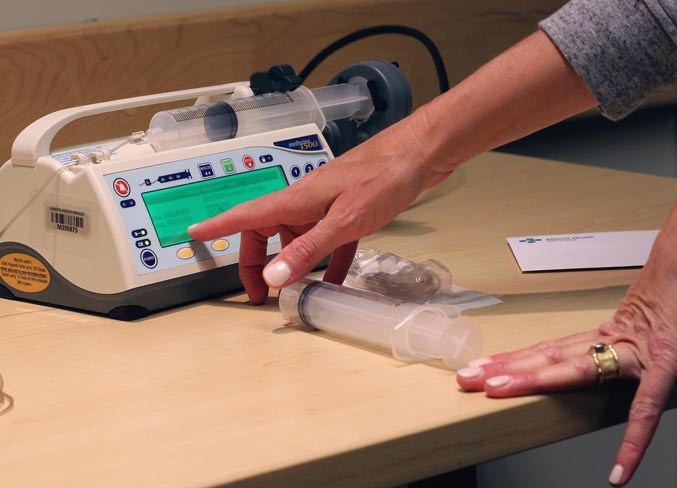Cochrane Two Pharmacy recently donated some much needed medical equipment to Cochrane Urgent Care. Following Hurricane Maria in September 2017 the world supply of mini-bags - 50 or 100 ml bags of saline solution that dilutes medication that is delivered intravenously - came in short supply. In Alberta, it was announced that there may be a two-year shortage province-wide. On average Cochrane Urgent Care gives intravenous medications to 15 to 25 patients daily. Glenn Curtis, a doctor with urgent care said there are few alternatives to the mini-bags. However, one practical solution is a syringe infusion pump, a device which efficiently replaces the mini bag. However, the pumps cost on average $3,885 each and urgent care needs at least two. While many of the larger hospitals in Alberta have the resources to obtain the needed pumps, Curtis said Cochrane was not in a similiar position. "The only alternative was for a nurse to sit there ... and manually squirt (the medication) in over 15 minutes, which is not a good use of nursing time and not nearly as precise," Curtis said. That's when Curtis, via the Cochrane Rotary Club, sent a letter to Two Pharmacy in December stating the need for Mini Pumps to be used in place of mini-bags. As part of the pharmacy's Health for You, Health for Another initiative, the store was able to purchase and donate two pumps. "Every patient that comes into the store, we make a donation toward something, either internationally or here in town. This was one of our projects," said Kelly Kimmett, one of the four pharmacy owners. "Now we're putting them in use so (we're) very happy to help out." The pumps are also mobile with the ability to attach onto a pole. As well, in the event that a patient is too sick to be without the pump for even a few minutes during EMS transport, the pumps are can go along with EMS and then are returned once the patient has been stabilized in another hospital. Linda Walters, manager of Cochrane Urgent Care, said so far they have three clinical registered nurses trained to use the pump as well as a clinical educator. "They're going to be available on pretty much every shift once we put them out so we needed to have that detailed education," Walters said. Curtis added that the syringe pumps have the ability to identify the make and size of the syringe placed in the pump - a type of fail-safe from measurement errors. "These are standard of care in the children's hospital," Curtis said. "This is the alternative. We now have complete capability."




